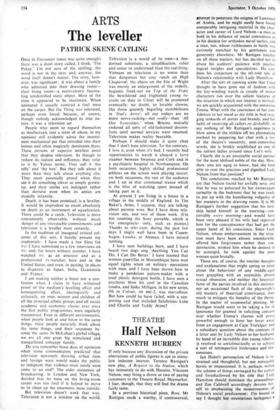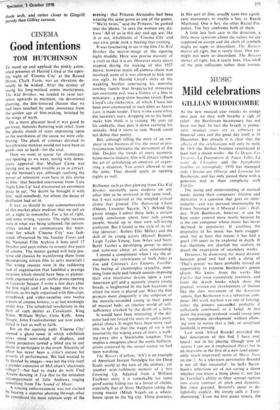THEATRE
Half Nelson
KENNETH HURREN
If only because any discussion of the private aberrations of public figures is apt to stimu- late indecent interest, Terence Rattigan's new play, A Bequest to the Nation, which has intimately to do with Horatio, Viscount Nelson, may bring a drove or two of paying customers to the Theatre Royal, Haymarket. I fear, though, that they will find the drama fairly tame.
In a previous historical piece, Ross, Mr Rattigan made a worthy, if controversial, attempt to penetrate the enigma of Lawrence of Arabia, and he might easily have found comparably intriguing material in the char- acter and career of Lord Nelson—a man as bold in his defiance of social convention as in his disdain for orthodox naval tactics, and a man, too, whose ruthlessness in battle was curiously matched by his gentleness and generosity elsewhere. Mr Rattigan touches on all these matters, but has decided not to abuse his auditors' patience with psycho- logical insights and speculations. He con- flnes his conjecture to the oft-told tale of Nelson's relationship with Lady Hamilton.
After the sort of opening scene that I had thought to have gone out of fashion with the key-winding watch (a couple of minor characters run over the salient features of the situation in which our interest is invited), we are quickly acquainted with the notorious Emma. What with the coarseness of her con- fidences to her maid as she lolls in bed swig- ging tankards of porter and brandy, and her habit of receiving all callers en deshabille, to say nothing of Mr Rattigan's eagerness to blow some of the mildew off his playmaking method by peppering her chat with a few of the theatre's unseemly, post-censorship words, she is briskly established as one of the saltiest ladies around since Lot's wife.
Clearly she is an unsuitable social partner for the most idolised noble-of the day. How, then, you are agog to know, had she been able to oust the gracious and dignified Lady Nelson from that position?
The conclusions reached by Mr Rattigan are that Nelson found her awfully sexy, and that he was so poleaxed by her extravagant carnality in the bedroom that he was ready to- put up with the humiliating vulgarity of her manners in the drawing room. It is Mr Rattigan's further suggestion that his lord- ship hated himself in the morning—con- ceivably every morning—and would have been very pleased if his wife had reproved him for the concupiscence that had got the upper _hand of his conscience. Since Lady Nelson, whose embarrassment in the situa- tion must have been almost unendurable. offered him forgiveness rather than con- demnation, stroked him when he desired to be scourged, he took against the poor woman quite brutally.
These are, of course, the routine thoughts and explanations that might spring to mind about the behaviour- of any middle-aged man grappling with an ostensibly absurd sexual obsession, and neither the historical fame of the parties involved in this instance. nor an occasional flash of the playwright's old mastery of theatrical contrivance, does much to mitigate the banality of the theme. In the matter of suspenseful plotting, Mr Rattigan would seem to be taking a lot of ignorance for granted in soliciting concern over whether Emma's charms will prove powerful enough to keep her lover away from an engagement at Cape Trafalgar; and a subsidiary question about the contents of a letter sent by Lady Nelson to her husband. by hand of an incredibly dim young relative. is resolved so anticlimatically as to achieve a sort of retrospective irrelevance and tire- someness.
'
Ian Hobo's personation of Nelson is re- strained and thoughtful, but not noticeably heroic or impassioned. It is, perhaps, within the scheme of things envisaged by the author and foreshadowed by his title that Lady Hamilton should dominate the proceedings. and Zoe Caldwell accordingly devotes her- self to emphasising the monstrousness of Nelson's social predicament: I'm bound to say I thought her ostentatious inelegance a
shade arch, and rather closer to Ging°Id parody than Gillray cartoon.







































 Previous page
Previous page